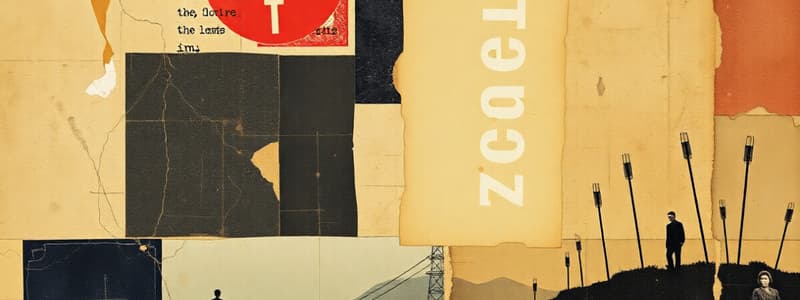Podcast
Questions and Answers
Which of the following is a type of narrative poetry?
Which of the following is a type of narrative poetry?
- Ballad (correct)
- Sonnet
- Elegy
- Ode
What is a lyric poem primarily about?
What is a lyric poem primarily about?
- Historical events
- Nature
- Theater performance
- The speaker's thoughts (correct)
An epic is a short poem that tells a story.
An epic is a short poem that tells a story.
False (B)
What are the three forms of sonnet?
What are the three forms of sonnet?
In what format is a graphic novel typically presented?
In what format is a graphic novel typically presented?
A _____ is a work of long prose fiction, usually centered around characters and events.
A _____ is a work of long prose fiction, usually centered around characters and events.
Match the following literary genres with their descriptions:
Match the following literary genres with their descriptions:
What is the main purpose of poetry?
What is the main purpose of poetry?
Digi-Fiction is exclusively read from physical books.
Digi-Fiction is exclusively read from physical books.
Flashcards are hidden until you start studying
Study Notes
Literature Overview
- Literature encompasses written works such as books, poems, and plays, reflecting human experiences and emotions.
- It is divided into two main forms: Prose and Poetry.
Poetry
- Poetry utilizes language and sound innovatively and includes various forms.
- Types of Poetry:
- Narrative Poetry: Tells a story and includes forms like:
- Epic: Long narrative about legendary heroes and quests.
- Ballad: Tells a story with a repeating chorus; emotional and rhythmic.
- Metrical Tale: Story presented in verse with structured stanzas.
- Lyric Poetry: Expresses the speaker's thoughts and emotions, often in song form. Common forms include:
- Ode: A formal poem praising a subject.
- Sonnet: A 14-line poem with varied rhyme schemes.
- Elegy: A poem mourning the loss of someone.
- Dramatic Poetry: Meant for performance; involves characters' dialogues and includes:
- Tragedy: Explores serious themes.
- Comedy: Aims to entertain with humor.
- Melodrama: Emphasizes exaggerated emotions.
- Farce: Relies on absurd situations for comedic effect.
- Social Tale: Addresses societal issues.
- Narrative Poetry: Tells a story and includes forms like:
Sonnet Forms
- Petrarchan: Rhyme scheme: abba abba cde cde or abba abba cdc dcd.
- Shakespearean: Rhyme scheme: abab cdcd efef gg.
- Spenserian: Rhyme scheme: abab bcbc cdcd ee.
Prose
- Prose is written in ordinary language, using complete sentences and organized paragraphs. It emphasizes plot and character development.
Fiction
- Novel: Long narrative fiction focused on detailed characters and events.
- Short Story: Concise fictional narrative, typically shorter than a novel.
- Novella: Narrative form longer than a short story, generally between 20,000 and 40,000 words.
- Fable: Brief story conveying a moral lesson, often featuring animals as characters.
- Parable: Simple story illustrating a moral or spiritual lesson.
- Legend: Traditional story rooted in historical events, often embellished with mythic elements.
Non-Fiction
- Diary: A personal record of daily events and thoughts.
- Anecdote: A short, interesting story about a real incident or person.
- Essay: A written composition exploring a specific topic or argument.
21st Century Literature
- New literary genres have emerged, reflecting contemporary experiences and technologies.
Media in Literature
- Literature can extend into various media forms:
- Illustrated Novels: Combine text with images; significant parts of the narrative rely on visuals.
- Digi-Fiction: Interactive fiction designed for computers, often featuring hyperlinks and multimedia elements.
- Graphic Novels: Comic-book style storytelling, presenting complete narratives in book format.
- Manga: Japanese comics, which read from right to left.
Example of a Sonnet
- "Sonnet 116," explores the enduring nature of true love, emphasizing that real love remains unchanged by time or circumstances.
Summary of Genres
- Literature's diversification highlights evolving cultural narratives and innovations in form and content, catering to modern audiences and technological advancements.
Studying That Suits You
Use AI to generate personalized quizzes and flashcards to suit your learning preferences.





